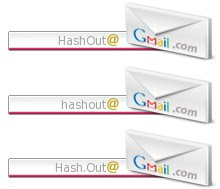by Aziz
on
Friday, February 01, 2008
Google has been well known for policing click fraud on its AdSense service. But Digital Inspiration has recently
unearthed information about Google policing its
Gmail service.
Google decides how many people you can send an email at a time. 100 from POP or IMAP clients and 500 from the web client. Also, Google will penalize your account if a lot of emails you send bounce back due to failed delivery.
Have you had any such experience with Google policing your use of Gmail?
»
Continue reading
Read more on
Email
by Aziz
on
Wednesday, August 15, 2007

Billions of emails are sent daily, many across the world, some between one desk and the next -- plenty of opportunity to inadvertently offend or annoy, especailly in a work situation. So:
Be brief. Emails that are more than a screen long are daunting and irritating. With friends you can be chattier.
Style counts. Spell check notes before you hit "send." Writing using ALL CAPITAL LETTERS signifies shouting; all small letters is hard to read.
Answer promptly. At work, respond within the day. When you are out for a day or more, program an "I'm away" auto reply.
Ignore chain mail, jokes and petitions. Almost no one likes them. Resist forwarding them unless they seem highly relevant.
Identify yourself. For business emails, create a standard sign-off that includes your full name, title, phone number, address and any pertinent infromation about your company.
»
Continue reading
Read more on
Email,
Internet,
Tips and Tricks
by Aziz
on
Sunday, July 08, 2007

If you really want to know something, don't email your question to hordes of people. Researchers have found that the more people you email, the more likely each recipient is to ignore it.
Greg Barron and Eldad Yechiam emailed 240 colleages at Technion Israel Technology Institute -- individually or in a group -- to find out response rates. Posing as a female student, they asked people if the institute had a biology faculty.
Replies ranged from "very helpful" (with extra information) to plain brusque "Look on the web page!". Others simply tried to chat "her" up.
Only half of group recipents responded, compared with 64 percent of those with just their own name in the "To" box. Single recipients were also twice as likely to be "very helpful".
"Like bystanders at a crime scene, people assume that someone else will help," says Barron. "So if you want a volunteer to bring a cake to Monday's meeting, sending an email to lots of people might not be the way to go."
»
Continue reading
Read more on
Computers,
Email,
Internet
by Aziz
on
Tuesday, June 19, 2007

The Internet is a great way to share information, but also to spread lies and mischievous nonsense. When you get an unsolicited email, these warning signs, from
urbanlegends.about.com, should ring alarm bells:
- The text was not originally written by the person who sent it to you.
- Phrases such as "This is NOT a hoax..."
- ...Or "Forward this to everyone you know."
- Overly emphatic language or heavy use of CAPITALS and exclamation marks!!!!!!!!
- Language that seems more geared to persuade than to inform.
- Claims to offer important information you've not heard before from legitimate sources.
- Subtle jokes that might suggest leg pulling.
- No reference to outside sources nor links to websites with corroborating information.
- Replies with "Re:" in the subject title from people you haven't written to.
»
Continue reading
Read more on
Computers,
Email,
Internet,
Tips and Tricks
by Aziz
on
Monday, June 18, 2007

Few careers can now do without email. How effectively do you deal with it? Take this true-or-false quiz to find out!
- Emails should be short.
- The subject line should be short.
- All messages should be marked urgent so people will read them.
- You should respond to email messages within 24 hours.
Answers:
- True. People don't have time to read pages of material on a screen. If your message is longer than screen-length, send it a different way.
- False. With so much spam around, many people won't open an email unless they know who it's from or the subject is clear. Writing hi, or leaving the subject line black, leaves the reader confused.
- False. People will know you always do this and won't consider your e-mail urgent, even when it is.
- True. If you don't have the info, send an email to acknowledge you got their message and let them know when you'll have the info.
»
Continue reading
Read more on
Computers,
Email,
Internet,
Tips and Tricks
by Aziz
on
Friday, June 01, 2007

Lots of people still ask, "Does your e-mail ID use capitals or lower case?" But that question is a technical no-brainer, because it simply doesn't matter whether you use capitals or lower case -- meaning small letters -- in an email address. The email will be delivered anyway: you may type the address with all capitals, all lower case, or randomly combine both.
Yet there's one place where capitals can secure your emails: in your password. Having a password like "ScoRPioN" or "sCorpiON" instead of a plain "scorpion" makes it tougher to hack.
You might also be surprised to note that having an email address like "John.Smith@gmail.com" on Gmail is equivalent to "JohnSmith@gmail.com" or for that matter even any other combination like "J.ohnSmith@gmail.com" or "J.o.hnSmith@gmail.com" or "Jo.hnSmith@gmail.com".
That is, Gmail does not consider "." as part of the email address and removes all "." from the email address before delivering messages to the particular inbox. If you have dots in your gmail address or even if you don't have a dot, just try sending yourself and email by placing a dot somewhere or switching the position of the dot in your email address, before the @ symbol but ofcourse and look you've got a mail!.
It also means that if someone already has an email address say "a.bc@gmail.com" then all other combinations of the same letters in the same order with different numbers and positions of dots will be unavailable for signup. For example "abc@gmail.com" or "a.b.c@gmail.com" or "ab.c@gmail.com" will be unavailable for signup in the case of the above email address.
»
Continue reading
Read more on
Computers,
Email,
Internet
by Aziz
on
Saturday, February 17, 2007
In continuation to Amit Agarwal's post "
Google Labs Gathering Dust, No New Product Since 5 Months" I would like to add another feature request to Google.
Google has made the web version of Google Reader to imitate Gmail. However, Google is yet to come out with a mobile version of Google Reader similar to that of Gmail. Google reader currently does have a mobile-friendly interface that works within a WAP browser but it requires signing in every time you need to browse your reading list.
Alternatively Google can add Reader capabilities to Gmail itself, like Yahoo! Mail Beta so that all the info (email and feeds) can be found in one place.
»
Continue reading
Read more on
Cell Phones,
Email,
RSS/Feeds/Syndication
by Aziz
on
Friday, February 16, 2007
I think I am a little late on this due to the long break. But I feel it invites a lot of debate. Especially because
Google has changed its policy overnight.
 Eighteen months ago Google said that SMS invitation codes were used to prevent SPAM accounts and now Google has opened Gmail to anyone anywhere in the world without the need of any invitation code, either from a friend or through SMS. It's true that any web based service that monetizes from ads needs more users but then how is Google gonna fight spam now? Have they got any alternative arrangements?
Eighteen months ago Google said that SMS invitation codes were used to prevent SPAM accounts and now Google has opened Gmail to anyone anywhere in the world without the need of any invitation code, either from a friend or through SMS. It's true that any web based service that monetizes from ads needs more users but then how is Google gonna fight spam now? Have they got any alternative arrangements?
It has been reported that the change did not occur simultaneously across all Google data centers and there might still be some places where the link is yet to appear.
Also another speculation doing the rounds is that Google might launch a paid premium service like Yahoo! But before that could happen it needs to be out of Beta, or is it already out of beta? If yes, then the folks at Google need to fix the graphic.
»
Continue reading
Read more on
Email,
Internet,
Web 2.0

 Billions of emails are sent daily, many across the world, some between one desk and the next -- plenty of opportunity to inadvertently offend or annoy, especailly in a work situation. So:
Billions of emails are sent daily, many across the world, some between one desk and the next -- plenty of opportunity to inadvertently offend or annoy, especailly in a work situation. So: If you really want to know something, don't email your question to hordes of people. Researchers have found that the more people you email, the more likely each recipient is to ignore it.
If you really want to know something, don't email your question to hordes of people. Researchers have found that the more people you email, the more likely each recipient is to ignore it.
 Few careers can now do without email. How effectively do you deal with it? Take this true-or-false quiz to find out!
Few careers can now do without email. How effectively do you deal with it? Take this true-or-false quiz to find out! Lots of people still ask, "Does your e-mail ID use capitals or lower case?" But that question is a technical no-brainer, because it simply doesn't matter whether you use capitals or lower case -- meaning small letters -- in an email address. The email will be delivered anyway: you may type the address with all capitals, all lower case, or randomly combine both.
Lots of people still ask, "Does your e-mail ID use capitals or lower case?" But that question is a technical no-brainer, because it simply doesn't matter whether you use capitals or lower case -- meaning small letters -- in an email address. The email will be delivered anyway: you may type the address with all capitals, all lower case, or randomly combine both.